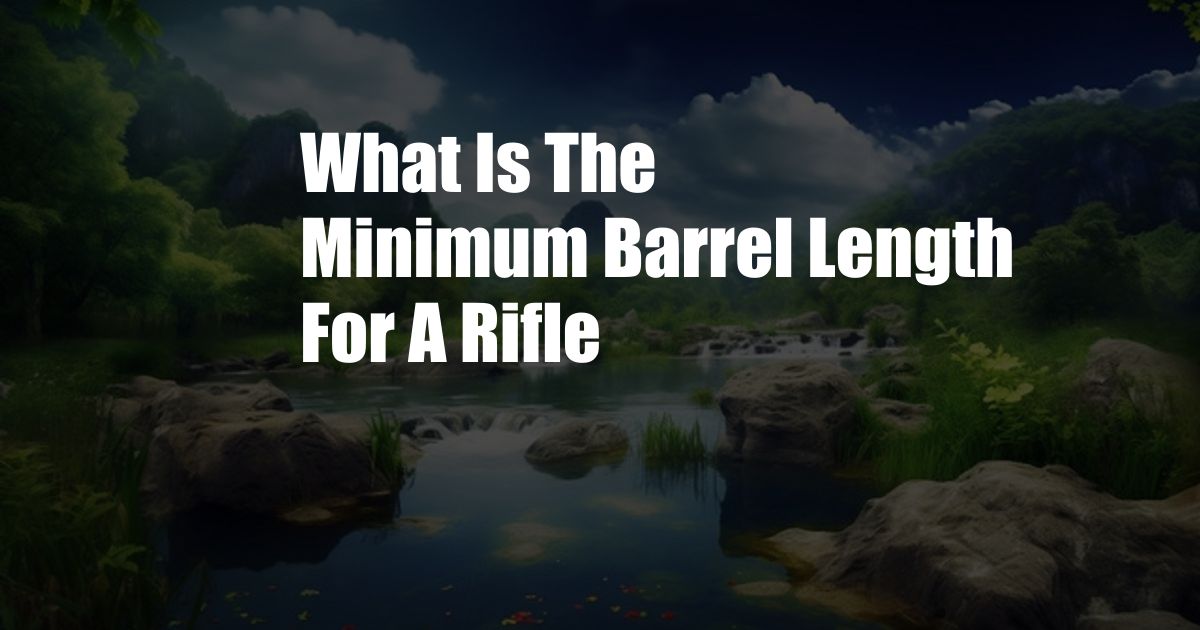
The Minimum Barrel Length for a Rifle: A Comprehensive Exploration
In the realm of firearms, the barrel length of a rifle plays a pivotal role in influencing its performance. Whether you’re a seasoned hunter, a competitive shooter, or simply an enthusiast, understanding the minimum barrel length for a rifle is crucial for making informed decisions. In this article, we’ll delve into the intricacies of this topic, examining its definition, history, and significance.
Navigating the complexities of firearm regulations can be challenging, and the minimum barrel length requirement is no exception. To ensure legal compliance, let’s explore the concept further, shedding light on the underlying factors that determine the minimum barrel length for a rifle.
Defining Minimum Barrel Length
The minimum barrel length for a rifle refers to the shortest permissible length of the barrel as defined by law. In the United States, the National Firearms Act (NFA) of 1934 stipulates a minimum barrel length of 16 inches for rifles and 18 inches for shotguns. These regulations aim to prevent the proliferation of concealable weapons that could pose a threat to public safety.
Understanding the rationale behind these regulations is crucial. Shorter barrels can make firearms easier to conceal, potentially facilitating their use in criminal activities. By establishing a minimum barrel length, law enforcement seeks to curb the misuse of firearms and maintain public order.
Historical Perspective on Barrel Length Regulations
The history of barrel length regulations is intertwined with the evolution of firearms technology. In the early days of firearms, muskets and rifles had long barrels, often exceeding 30 inches in length. These extended barrels were necessary to stabilize projectiles and improve accuracy.
As technology advanced, the development of rifled barrels and smokeless powder enabled firearms to achieve greater accuracy with shorter barrels. However, the proliferation of short-barreled firearms during the Wild West era raised concerns about their concealability and potential for misuse. This led to the enactment of minimum barrel length laws to mitigate these risks.
Significance of Minimum Barrel Length
The minimum barrel length requirement has profound implications for firearm performance. A shorter barrel can affect the firearm’s velocity, accuracy, and overall handling characteristics. Here’s a detailed breakdown:
- Velocity: Shorter barrels result in decreased bullet velocity due to reduced dwell time within the barrel. This can impact the effective range and terminal performance of the firearm.
- Accuracy: While shorter barrels may provide improved handling, they can compromise accuracy at longer distances compared to longer barrels.
- Handling: Shorter barrels generally offer better maneuverability and reduced weight, making them suitable for close-quarters scenarios or rapid target acquisition.
Latest Trends and Developments
The topic of minimum barrel length for rifles remains a subject of ongoing discussion within the firearms community. Advancements in firearms technology and ammunition design have prompted debates about the potential for shorter barrels to deliver comparable performance to longer barrels. Manufacturers are exploring innovative designs and materials to optimize barrel length for specific applications.
Some jurisdictions are considering amendments to minimum barrel length regulations to accommodate the evolving needs of firearm enthusiasts. However, any changes to existing laws would require careful consideration of potential safety and law enforcement implications.
Tips and Expert Advice for Choosing the Right Barrel Length
Selecting the optimal barrel length for your rifle depends on the intended purpose and personal preferences. Here are some expert tips to guide your decision:
- Purpose: Determine the primary use of the rifle, whether it’s for hunting, target shooting, or self-defense. Different purposes may call for different barrel lengths.
- Caliber: Consider the caliber of the rifle, as different calibers may perform differently with varying barrel lengths.
- Accuracy: Longer barrels generally provide better accuracy, especially for long-range shooting.
- Handling: Shorter barrels offer improved maneuverability and reduced weight, making them suitable for close-quarters scenarios.
- Legal Compliance: Always adhere to the minimum barrel length requirements set forth by law to avoid legal consequences.
Seeking guidance from experienced firearm instructors or reputable gunsmiths can provide valuable insights and ensure that your choice meets your specific needs and complies with all applicable regulations.
FAQs on Minimum Barrel Length for Rifles
To further enhance your understanding, here’s a comprehensive FAQ section:
- Q: What is the federal minimum barrel length for a rifle?
A: 16 inches - Q: What factors influence the performance of a rifle with a shorter barrel?
A: Velocity, accuracy, and handling characteristics - Q: Can a rifle have a barrel shorter than the minimum legal length?
A: Yes, but it requires a special tax stamp and specific legal considerations - Q: What are the benefits of a shorter barrel?
A: Improved maneuverability, reduced weight, and potential tactical advantages - Q: What are the drawbacks of a shorter barrel?
A: Decreased velocity, reduced accuracy at longer distances, and potential legal implications
Conclusion
Understanding the minimum barrel length for a rifle is essential for making informed decisions about firearm selection and use. Whether you’re a firearms enthusiast, a recreational shooter, or a professional in the field, adhering to regulations and selecting the appropriate barrel length is paramount for safety, performance, and legal compliance. Consider the tips and expert advice provided, consult reputable sources for further knowledge, and always prioritize responsible and lawful firearm ownership.
Are you interested in learning more about firearms and their regulations? Share your thoughts and questions in the comments section below, and let’s continue the discussion!